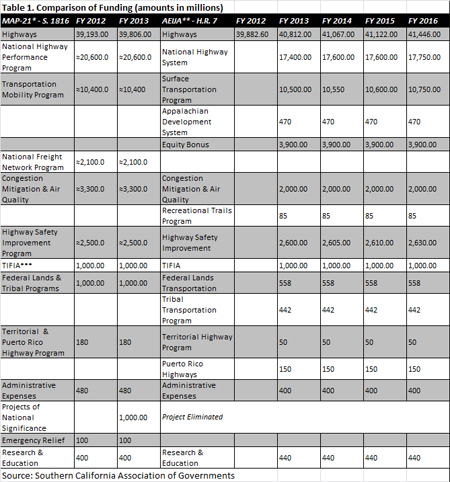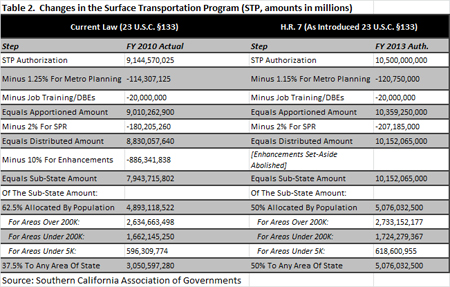The Association of Metropolitan Planning Organizations (AMPO) created a side-by-side comparison of current federal transportation policy with changes proposed by Moving Ahead for Progress in the 21st Century (MAP-21) bill in the U.S. Senate and the American Energy and Infrastructure Jobs Act (AEIJA) in the U.S. House of Representatives. AMPO's analysis focuses on the bills' transportation planning provisions. Notably, MAP-21 would divide MPOs into two tiers and would impose more stringent planning requirements on larger MPOs. AEIJA would largely maintain current law, but it would allow a Governor to modify an MPO's Transportation Improvement Program (TIP) in the event of a disagreement between the MPO and state over interstate projects of statewide significance. Both bills would increase the population thresholds for designation as an MPO, currently 50,000 residents, to 100,000 residents under AEIJA and 200,000 residents under MAP-21. Both bills would also modify the suballocation of the Surface Transportation Program (STP). Current law sets aside 10 percent of STP funds for Transportation Enhancements and suballocates 62.5 percent of funds to urbanized areas over 200,000 in population. MAP-21 and AEIJA would eliminate the 10 percent set-aside and reduce the large urbanized areas' suballocation to 50 percent of STP funds. For more details on the broader policy changes of these two proposed bills, see our policy analysis of MAP-21 (part 1 and part 2) and AEIJA (part 1 and part 2).
AMPO also posted a Transportation Weekly comparison of state-by-state funding levels under the two bills. In FY2011, Illinois received $1.475 billion in highway contract authority. In FY 2012, Illinois would receive $1.376 billion under AEIJA and $1.372 billion under MAP-21, which correspond to declines of 6.7 and 7.0 percent, respectively. Nationally, AEIJA would reduce highway contract authority by 6.9 percent during the same period while MAP-21 would impose a 2.7 percent cut.
Staff at the Southern California Association of Governments (SCAG) estimated MAP-21 and AEIJA funding impacts on federal transportation programs. We thank SCAG for allowing us to reproduce its tables below. MAP-21 would provide funding to a new National Freight Network Program and the Projects of National and Regional Significance program; AEIJA would fund neither. Funding for the core program areas is roughly comparable across the two bills. However, MAP-21 would provide substantially more funding to the Congestion Mitigation and Air Quality Improvement (CMAQ) program to reflect its expanded programmatic responsibilities, while AEIJA would provide more funding for rural transit, elderly and disabled transit programs, and transit state-of-good-repair programs. MAP-21 would fund various transit programs not included in AEIJA, such as a Clean Fuels Grant program and Transit Oriented Development Pilot Program.
*MAP-21 – Moving Ahead for Progress in the 21st Century – From Senate EPW Committee
**AEIJA – American Energy & Infrastructure Jobs Acts – From House T&I Committee
***TIFIA – Transportation Infrastructure Finance and Innovation Act
****FPTA 2012 – Federal Public Transportation Act of 2012 – From Senate Banking Committee


